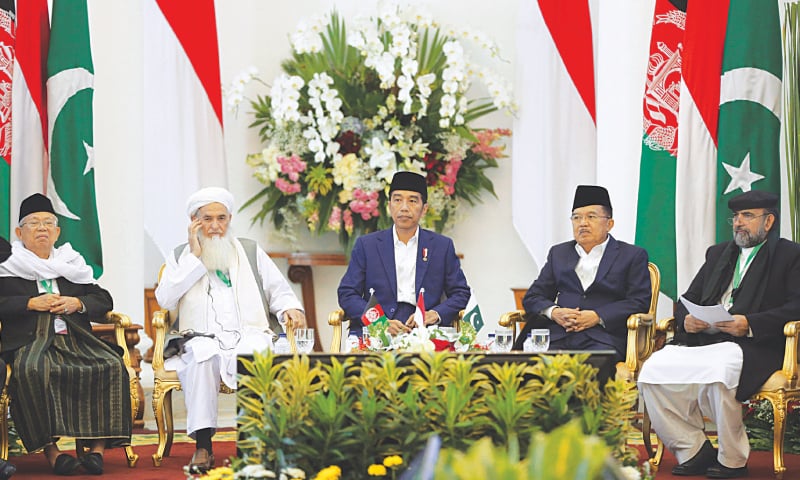BOGOR (Indonesia): Religious scholars from Afghanistan, Pakistan and Indonesia issued on Friday a declaration saying that violent extremism and terrorism, including suicide attacks, are against Islamic principles, in an effort to convince the Afghan Taliban to end violence.
Seventy prominent scholars, or ulema, from the three countries issued the declaration at a conference in Indonesia on ways to achieve peace and stability in Afghanistan.
Indonesian President Joko Widodo, who opened the one-day meeting, stressed Indonesia’s commitment to helping build peace in the war-torn country.
The president said the conference was part of Indonesia’s efforts to encourage the role of ulema in promoting peace in Afghanistan.
Seventy Pakistani, Afghan and Indonesian scholars endorse Ashraf Ghani’s peace efforts at conference in Indonesia
“Through the voice of ulema, mainly from Afghanistan, Pakistan and Indonesia, presumably the spirit of brotherhood for peace in Afghanistan can be strengthened,” Mr Widodo said.
“Ulema are the agent of peace... they have the power to form the face of peaceful people,” he said.
He expressed the hope that the conference could contribute to peace in Afghanistan.
The declaration
In their declaration, the 70 scholars said Islam was a religion of peace and denounced all kinds of violent extremism and terrorism.
“We reaffirm that violence and terrorism cannot and should not be associated with any religion, nationality, civilisation or ethnic group, as violent extremism and terrorism in all its forms and manifestations, including violence against civilians and suicide attacks, are against the holy principles of Islam,” it said.
The ulema expressed their support to Afghan President Ashraf Ghani’s offer to the Taliban regarding peace and reconciliation which he offered during the Kabul Process summit in February.
They also endorsed the efforts of regional countries as well as the international community aimed at bringing peace and stability in Afghanistan.
The ulema urged all parties involved in the conflict to participate in direct negotiations.
The Taliban had urged ulema to boycott the Bogor conference. In a warning to Afghan clerics, the militant group had said: “Do not afford an opportunity to the invading infidels in Afghanistan to misuse your name and participation in this conference as means of attaining their malicious objective.”
The conference held at the presidential palace in Bogor, a West Java town on the outskirts of Jakarta, was organised by the Indonesian Ulema Council.
Kalbe Ali adds from Islamabad: About 20 Pakistani scholars attended the conference in Indonesia. Prominent among these ulema were chairman of the Council of Islamic Ideology Prof Dr Qibla Ayaz, Allama Iftikhar Naqvi and Shah Owais Noorani.
Representatives of the seminary boards belonging to the Shia, Barelvi, Deobandi and Ahle Hadees schools of thought also took part in the conference.
A delegation from Indonesia that visited Pakistan had selected them for participation at the event.
During their visit to Pakistan the members of the Indonesian delegation held meetings with various officials and scholars and tried to learn about Islamabad’s efforts to counter the extremist mindset.
They were informed about the Paigham-i-Pakistan declaration and the establishment of military courts.
Published in Dawn, May 12th, 2018















































Dear visitor, the comments section is undergoing an overhaul and will return soon.